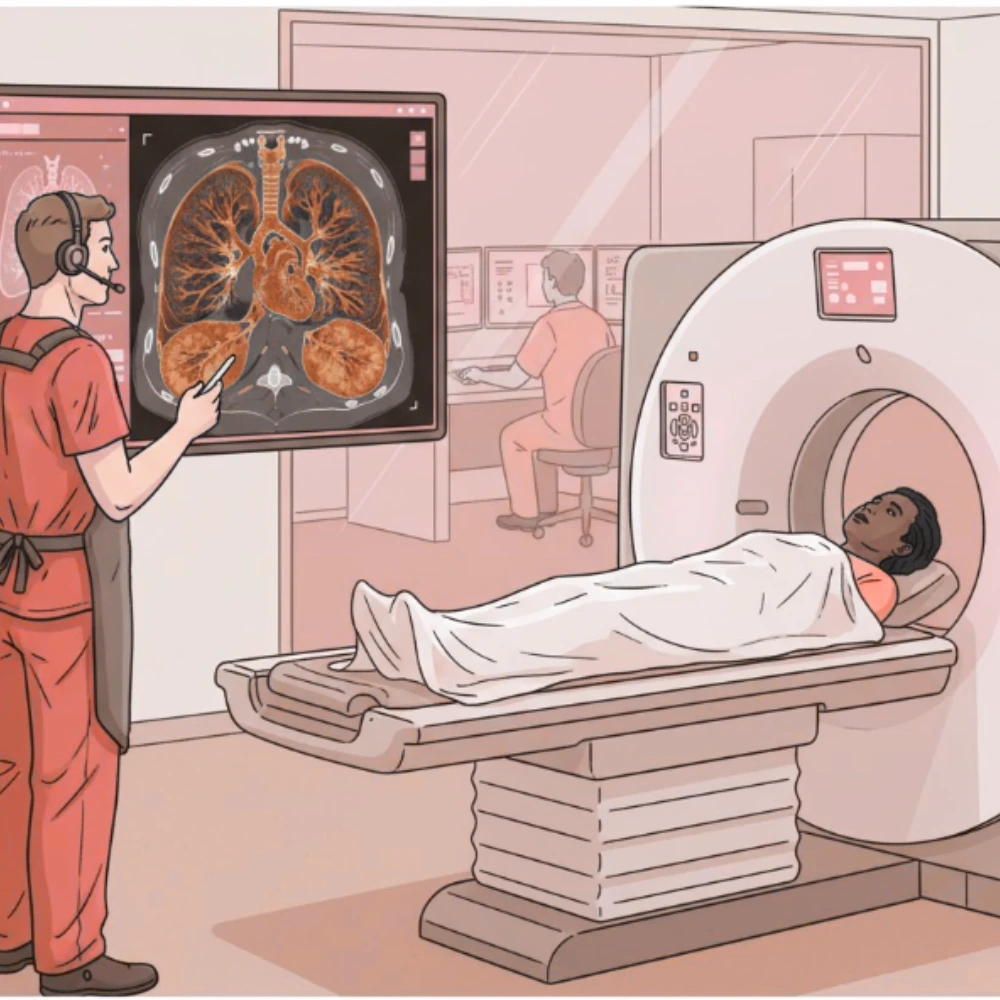
HRCT Scan – High-Resolution, Detailed & Advanced Lung Imaging
At Akshar Imaging Centre, we provide advanced HRCT (High-Resolution Computed Tomography) Scan services using the latest multidetector CT technology. Our HRCT scans produce high-resolution, cross-sectional 3D images of the lungs, airways, and surrounding chest structures, allowing pulmonologists, radiologists, and physicians to accurately diagnose interstitial lung diseases, pulmonary fibrosis, chronic lung conditions, infections, and structural abnormalities.
An HRCT Scan is a safe, non-invasive, and painless diagnostic imaging test. Compared to standard chest X-rays and conventional CT scans, it delivers far more detailed information, making it the gold standard for evaluating lung parenchyma, airway diseases, pulmonary nodules, and early detection of chronic respiratory disorders.
What Is an HRCT Scan?
An HRCT Scan uses advanced computed tomography to capture precise, thin-slice images of the lungs and airways. It helps doctors identify interstitial lung disease, bronchiectasis, emphysema, fibrosis, pulmonary nodules, infections, and early-stage lung abnormalities. This scan is essential for diagnosis, monitoring disease progression, and planning treatments or surgical interventions.
Why It’s Performed / Common Indications
- Chronic or unexplained cough, shortness of breath, or wheezing
- Evaluation of interstitial lung disease (ILD) or pulmonary fibrosis
- Detection of pulmonary nodules, masses, or early-stage lung cancer
- Assessment of bronchiectasis, emphysema, or COPD
- Investigating recurrent lung infections or pneumonia
- Preoperative evaluation for thoracic surgery
- Monitoring disease progression or response to treatment
- Detection of pulmonary embolism or vascular abnormalities in some cases
Preparation
- Usually, no special preparation is required.
- Remove any jewelry, watches, or metallic objects from the chest and neck area.
- Wear comfortable clothing or a gown during the scan.
- Inform the technologist if you are pregnant or suspect pregnancy, as HRCT scans involve radiation.
- In certain cases, contrast dye may be used — disclose any allergies or kidney issues beforehand.
Procedure
- You will lie down on the CT scanner table, which slides slowly into the machine.
- The scanner rotates around your chest to capture thin, high-resolution slices of the lungs.
- You may be asked to hold your breath briefly to avoid motion blur.
- If contrast dye is needed, it will be administered via an IV line.
- The scan itself takes only a few minutes; the entire process is usually completed in 10–15 minutes.
What Happens Next (Interpretation)
A radiologist carefully reviews the HRCT images to evaluate:
- Interstitial lung disease, fibrosis, or scarring
- Pulmonary nodules, masses, or tumors
- Airway abnormalities like bronchiectasis or emphysema
- Evidence of infections or pneumonia
- Pulmonary vascular abnormalities
- Pre-surgical assessment and disease monitoring
Benefits vs. Risks
Benefits:
- Provides highly detailed, thin-slice 3D images of the lungs and airways
- Detects early lung abnormalities often missed on X-rays or standard CT
- Essential for diagnosis, monitoring, and preoperative evaluation
- Quick, accurate, and non-invasive diagnostic tool
Risks:
- Involves a small dose of radiation (minimized with modern HRCT scanners)
- Rare risk of allergic reaction if contrast dye is used
- Generally not recommended during pregnancy unless medically necessary
Why Choose Akshar Imaging Centre
- Advanced HRCT scanner for high-resolution lung and airway imaging
- Experienced radiologists specialized in thoracic and pulmonary diagnostics
- Comfortable, patient-friendly environment with minimal wait times
- Fast and reliable report delivery for timely treatment
- Convenient location in Ahmedabad with easy scheduling options
Frequently Asked Questions (FAQs)
1. Is an HRCT Scan safe?
Yes. It involves low radiation exposure and is very safe. Extra precautions are taken for children and pregnant women.
2. How long does the scan take?
The scan itself takes just a few minutes; the full appointment usually lasts around 10–15 minutes.
3. Why has my doctor advised this test?
It may be to evaluate chronic lung disease, fibrosis, pulmonary nodules, infections, or for preoperative planning.
4. Do I need contrast dye for this scan?
Contrast is used only if your doctor requires enhanced imaging of blood vessels or certain tissues.
